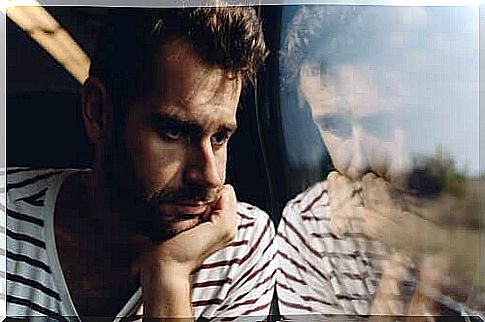Existential Vacuum: When Life Is Meaningless

An existential vacuum is a crisis of meaninglessness. A feeling of stomach ache that makes life meaningless. A place where there is only suffering and decoupling from the surrounding world.
Life is meaningless. It is the primary belief among those who feel an indifference to life. People who feel the weight of injustice and a form of decoupling to everything that surrounds them. In other words, they feel an existential void.
They are, as a rule, reflective people who think about deep matters, such as death or lack of freedom, and they cannot get rid of an existential vacuum that eats them up from within. It is a void that society contributes to, by constantly sending messages about what is valuable or not, and about getting instant gratification.
But, they are also constantly chasing pleasure with the goal of soothing their ailments. The problem is that they are not really aware of the emptiness they are feeling.
For some people, there is no good answer to the question “what is life worth living for?”. There is nothing that completes them, something that satisfies them, and that is exactly what catches them in the mental state of suffering. In most cases, this situation ends up in deep depression or self-destructive behavior.
An existential void is a crisis of meaninglessness, and it is the result of seeing oneself as one who sees the world with a different perspective, due to inconsistencies, or as someone who is driven away by constant pursuit of pleasure to avoid suffering. It’s a widespread phenomenon in today’s world, so let’s dive deeper into it.

Existential vacuum: In the depths of the abyss
The meaning of life that develops in your mind can crumble when your goals do not end up the way you want them to. When there is a big difference between expectation and reality, you may feel really disappointed.
When a critical situation threatens the sense of security and certainty and you do not have the resources to deal with them, you may also feel frustrated.
All this leads to a deep state of existential frustration, and sometimes to a painful abyss. It is as if you are carrying a desert within you where absurdity defines existence and any ability to connect with others is lost.
Psychologist Benjamin Wolman calls this an “existential neurosis”, and he defines it as:
The social aspect
Some writers, such as psychotherapist Tony Anatrella, point out that lack of meaning stems from the constant pursuit of satisfying one’s own ego, as it is selfish actions that deter you from achieving self-excellence.
So, you may be able to focus on all your individual desires, and dilute the social aspects, such as coexistence, solidarity, or respect.
When you do not understand reality and your intention to be happy becomes your goal, there is a great risk of experiencing an existential void. Pleasant, short-lived emotions, such as joy, can create well-being, but not self-actualization. As with any other pleasure, they can be addictive or slave-binding.
Somehow, you have to do something with your life. It must not only be good for you, but also created by you. Therefore, the meaning of life is related to the destiny you want and need. For through that desire, you can expect to develop yourself freely.
When you feel happy, this is where your freedom overcomes the dividing line of immanence, and you will understand that the meaning of life is not material or limited, but much more than this.
However, when things do not go as you expected, a lack of meaning in life can lead you to the abyss of an existential void.

Human noetic dimension
According to the Australian psychiatrist, Viktor Frankl, humans have, mainly, three dimensions:
- Somatic dimension, which includes the body and the biological area.
- Psychic dimension that involves the psychodynamic reality, or both the psychic and emotional universe.
- Noetic or spiritual dimension that covers the phenomenology of the soul. Therefore, this dimension goes beyond the other two. Furthermore, thanks to this, people can develop a healthy life, from a psychological point of view.
So, when you feel a profound sense of apathy, it means you are in conflict with your spiritual dimension. You may be unable to treat your wounds, or identify them at all.
You feel unable to find a reason to live. Therefore, you drown in suffering and you experience a lack of coherence and purpose. In other words, this is an existential void.
Social and individual values
Frankl emphasizes that the way to find meaning lies in one’s values. Social awareness is what helps it come to the surface. But, even though values come from personal intimacy, they tend to end up becoming universal values that fit some cultural, religious, or philosophical systems.
Therefore, connecting with others, as well as having loving bonds, is important so as not to lose the meaning of life as long as you do not make other people responsible for your own joy. In a way, a meaningful life has roots in social facts.
The French sociologist and philosopher Drukheim clearly describes the lack of social facts and what it entails:

Explore yourself before trying to find meaning in life
But, it’s not about pointing fingers or looking for a rescuer. Instead, it is about having a reflective and responsible attitude. It allows you to explore yourself. It’s about finding a purpose, and getting out of the existential void.
It is also convenient to acknowledge that there are several ways to define the meaning of life: As many as there are people in the world. In fact, any of us can change our purpose in life through our journey in life.
Therefore, what matters is not the meaning of life in general. The meaning is in a given moment, just as Viktor Frankl said.
Moreover, Frankl stated that we should not explore the meaning of life, but instead we should explore ourselves. Responsibility is the confidential essence of our existence: Find the meaning of life by finding yourself.
Change your attitude to get out of an existential vacuum
Even if you have invested time, energy, effort and your heart, life is sometimes unfair. While it’s understandable to feel bad, you have two options: Either you can accept that you can not change what has already happened and behave like a victim, or accept the fact that you can not change anything , in addition to your attitude towards it.
You are responsible for your own actions, feelings, thoughts and decisions. This is why you have the opportunity to decide what you want to feel responsible for.
The meaning of life will therefore constantly change. Every day and every moment you have the opportunity to make a decision. It will determine whether you are trapped in a situation or whether you will respond with dignity, listen to your true self, free yourself from pleasure traps and instant gratification.









